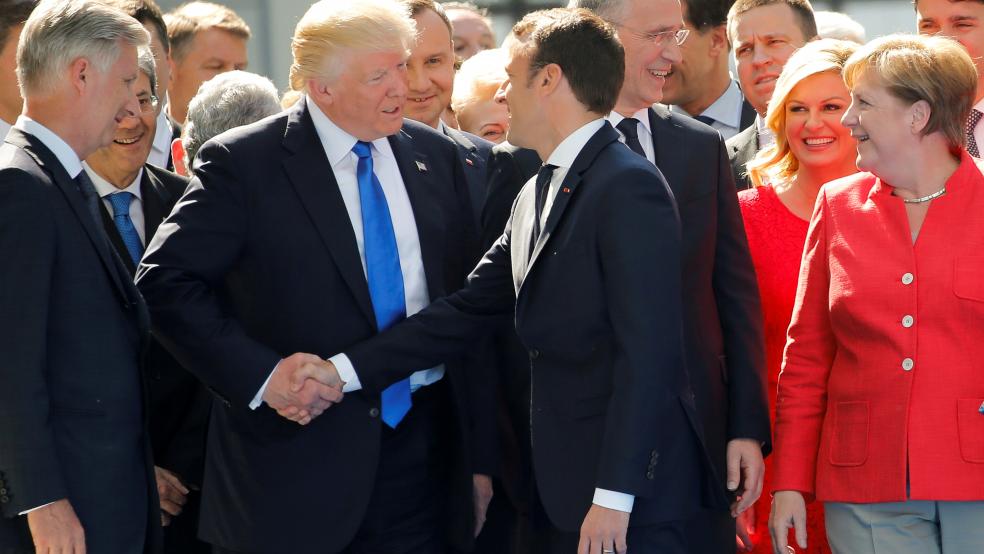A hundred generations have searched for this elusive path to peace, while a thousand wars raged across the span of human endeavor. Today that new world is struggling to be born, a world quite different from the one we've known. -- George H.W. Bush, address to a Joint Session of Congress, September 11, 1990.
In an op-ed published in The Wall Street Journal last night, President Trump’s National Security Adviser, Lt. Gen. H.R. McMaster, and Gary Cohn, the director of the White House National Economic Council, brought some clarity to the vision of a new world order that their boss tried to articulate in his nine-day overseas trip that concluded last weekend.
That vision, of a piece with Trump’s grim inaugural address, was very different from previous, more idealistic expressions of the future as America sees it.
Related: Trump's 'Big Win' in Europe Is the World's Big Loss
In the speech quoted above, delivered as a coalition of nations President Bush had prepared to push Saddam Hussein’s invading army out of Kuwait, he described a hopeful future where “the rule of law supplants the rule of the jungle. A world in which nations recognize the shared responsibility for freedom and justice. A world where the strong respect the rights of the weak.”
In their op-ed, McMaster and Cohn explicitly reject the elder Bush’s description of a world in which nations cooperate to further each other’s interests because it is the right thing to do and because it altruistically benefits everyone.
On the contrary, they write, “the world is not a ‘global community’ but an arena where nations, nongovernmental actors and businesses engage and compete for advantage.”
The good news in McMaster and Cohn’s construct is that America enters the arena as the strongest competitor. “We bring to this forum unmatched military, political, economic, cultural and moral strength,” they write. “Rather than deny this elemental nature of international affairs, we embrace it.”
Related: Trump Says the Trade Deficit With Germany Is ‘Very Bad’ – but Is It Really?
Referring to Trump’s European tour, they write, “At every stop in our journey, we delivered a clear message to our friends and partners: Where our interests align, we are open to working together to solve problems and explore opportunities.”
In other words: The United States stands with you -- as long as there’s something in it for us.
For better or worse, the president’s trip -- particularly his time spent in Europe -- was a broader expression of this new, transactional view of U.S. foreign policy. Trump shook the foundation of the North Atlantic Treaty Organization by failing to express support for the treaty’s mutual defense provisions, making it clear that he thought the treaty wasn’t favorable enough to the interests of the US. He left European leaders with the impression that he would withdraw the U.S. from the Paris Climate Accord, because, while it may be good for the planet, it isn’t good enough for the U.S., specifically.
Related: 9 of the Oddest Moments from Trump’s First Foreign Trip
To be clear, shifting America’s foreign policy stance from one of at least nominal internationalism to a more grasping and insular “America First” outlook isn’t illogical or crazy. It’s perfectly coherent to complain that an arrangement isn’t to the United States’ advantage and to demand better terms.
What it does, however, is diminish the stature of the United States.
America, for generations, has been the largest economy in the world, backed by the most powerful military in history. Over generations, by not wringing every concession it can from smaller, weaker nations, by shouldering a disproportionate share of mutual burdens simply because it can, the United States has built a credible claim to global leadership. The Trump administration is consciously throwing away that legacy.
McMaster and Cohn try to spin it differently, claiming, “This historic trip represented a strategic shift for the United States. America First signals the restoration of American leadership and our government’s traditional role overseas.”
But this isn’t leadership. Not unless a man is standing at the front of a rushing mob and shouting, “Every man for himself, and the Devil take the hindmost!” can be called a leader.





